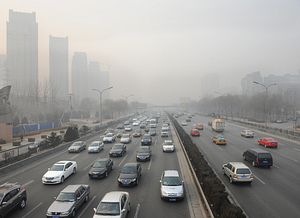With the APEC Leaders’ Summit in Beijing scheduled to begin on Monday, the issue of which of the world’s most powerful leaders in the Asia-Pacific will be meeting each other has dominated the news surrounding the event in the weeks leading up. However, with just a few days to go, Beijing’s stuttering attempts to clean up its streets and pollution are also beginning to grab equal attention. The issue of pollution is now a perennial problem for China’s large costal metropolises, and November begins the season when pollution levels reach their most problematic. As a response, the government of the Communist Party of China has been attempting to address this issue since early October.
On Thursday, Reuters reported that the environmental ministry announced that several regions had failed to implement the government’s steps to cut pollution ahead of the APEC Summit. Specifically, the government has attempted to strictly curb car traffic and production at factories and energy plants within 200 km of Beijing starting November 1 and ending on the 12th (the day after the Leaders’ Summit). However, the Ministry of Environmental Protection’s (MEP) 16 inspection teams have encountered resistance from local governments and businesses. Coking plants in Shanxi and Henan have either denied entrance to the inspectors or reverted to normal practices at night, while China’s official Xinhua news agency reported that the mayor of Henan’s city of Anyang had been brought before the MEP to explain why the city failed to reach the 30 percent cut in emissions that the ministry had set as a target before the summit begins.
High-pollution factories near Beijing were ordered to limit or even completely stop operations starting October 1, according to a government official who spoke to the AP. In addition, government workers have been given November 7 through 12 off and schools have been closed in order to limit commuters, while the government is also encouraging people to leave town without causing congestion by offering discounts on rail freight services to move people’s cars out of the city to select locations. However, it may still be a close call, with little help likely from the weather.
Aside from the pollution, the CPC is also worried about civil unrest and protests associated with such a high-profile summit. The same AP report stated that several political activists in Beijing have been visited by police, sometimes on a daily basis, and told to either leave the city or remain in their homes. The government is also showing significant concern about the possibility of a terrorist attack originating from its restive Xinjiang and Tibet regions. It is asking hotels to inform police of any visitors from those provinces, as well as Qinghai. Additionally, 1,000 facial recognition cameras have been installed in Huairou, the district where the summit will be held, and flying kites has been banned near the city’s airport “to ensure flight safety.”
While news of pollution and security measures are absorbing media attention in the days prior to the summit, discussion about the potential meetings of the visiting countries’ leaders is still being reported. The most anticipated bilateral meeting of the summit, between Chinese President Xi Jinping and Japanese Premier Shinzo Abe, is looking increasingly unlikely. As my colleague Zach noted earlier, Japanese officials said on Wednesday the ability for the two leaders to meet “is extremely difficult,” although not impossible. The officials however noted that “last minute efforts are being made,” and the two leaders may be able to “sit down for ‘informal’ talks of 10 to 15 minutes.”
While the Abe-Xi talks have dominated the bilateral news, meetings between China and South Korea’s leaders and foreign ministers will likely prove to be much more consequential. The subject of North Korea is expected to feature prominently in the foreign ministers’ meeting according to Yonhap news, and will also likely be discussed between Xi and President Park Geun-hye. China has been publically aloof with North Korea most of this year, while the last month has seen two high level meetings between the North and South. Seoul may attempt to bring Beijing back to the negotiating table with Pyongyang. As North Korea’s main ally and benefactor, China has considerable ability to convince it to resume talks over its ballistic missile and nuclear weapons programs. However, since last December’s execution of leader Kim Jong-un’s uncle Jang Song-thaek, who was China’s key ally within the North Korean leadership, Beijing has been reluctant to engage the Hermit Kingdom, and Xi has still not made an attempt to meet or contact Kim publicly since.

































